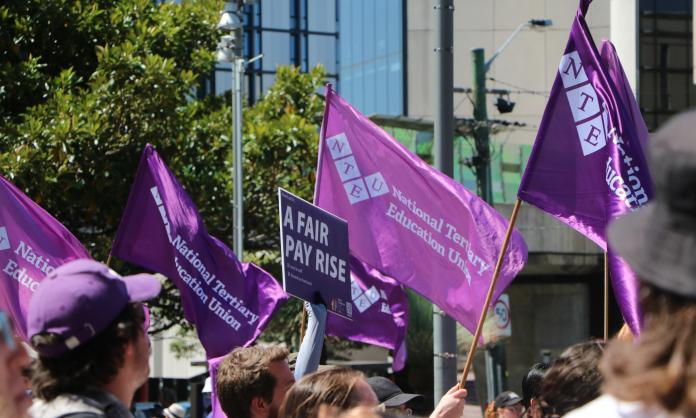We’ll need to bring a lot of industrial power to bear if we’re going to win the enterprise agreements we need. That means putting serious organising work into preparing for open-ended strikes.
1. Important lessons from Sydney Uni
Over twelve months, workers went on strike for a total of nine days. In the past, these sorts of sporadic strikes have won good conditions and beaten back management attacks.
But this time around, despite local and national officials’ statements to the contrary, workers at Sydney have been unsuccessful in defeating management’s attacks. These include an explosion in “education focused” roles with punishing workloads and the abolition of internal advertising for many professional staff positions.
Red Flag has published a detailed analysis of the Sydney Uni campaign. The main take home message is that it’s crucial to build the momentum and seriousness of strikes if we’re going to win.
2. We need open-ended strikes
The biggest strike in the United States last year was an open-ended strike by 48,000 “grad student” staff at the University of California. Supported by strike kitchens run by students, and strike pay, these workers won a 50 percent pay rise over the next eighteen months for the lowest paid workers, as well as improved conditions such as child care.
The University of California strike, along with other recent mass strikes at US universities, should lift our horizons about what’s possible. There’s a useful summary recently published at Jacobin.
3. Systematic organisation is key
Effective open-ended strikes are usually the product of large organising drives. There’s been plenty of talk in Australian unions about adopting the methods of well-known US organiser Jane McAlevey—making lists of workers, systematically approaching each one with a survey or open letter and using these “structure tests” to build majority support for open-ended strike action.
But there’s been very little follow-through on most campuses. This must change if we’re going to turn the tide on management’s neoliberal agenda.
As well as McAlevey’s books and website, there’s this useful presentation on McAlevey’s approach to organising from a 2020 NTEU Fightback forum.
4. Clear, ambitious, specific demands
An approach that makes only vague, unspecific promises (“fair wages”, “fair workloads”) will not drive member engagement, and makes it difficult for rank-and-file unionists to hold our bargaining teams to account.
We need to demand specific, enforceable clauses in the enterprise agreement. An item on the log of claims for “fair workloads” is a lot less useful than a clause specifying that management must fill all vacant positions, for instance. Demanding “fair wages” is less useful than publicising the NTEU’s official national wage claim of CPI plus 1.5 percent.
Some useful clauses—to address workload, outsourcing, casualisation, Aboriginal and Torres Strait Islander employment and more—are available on this clickable resource from NTEU Fightback.
5. A change in strategy for our union
For too long, the NTEU leaders have generally had an approach of “partnership” with the managers who run our workplaces. The low point of this strategy was the attempt by the NTEU’s national leadership to impose a national 15 percent wage cut throughout the industry in 2020.
That terrible concession was defeated by a national revolt of rank and file union members. Socialists played a leading role in that fight as part of NTEU Fightback. We need a union that draws on well-established organising methods to build towards open-ended strikes, to win the improvements that we and our students deserve.










